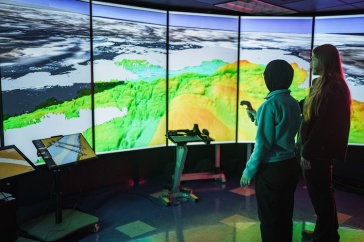
When it comes to landing gear for airplanes, you want something that’s just as strong on the thirty-thousandth landing as on the first. That’s the kind of perfection that captivates and motivates researchers at the University of New Hampshire.
Alone, in pairs, in collaborative teams both on campus and in larger consortia around the nation, UNH faculty are conducting breakthrough research supporting the $1.7 trillion industry known as advanced manufacturing — the use of innovative technology to improve products or processes.

The fruits of their research, which focuses on areas as diverse as woven composites, lightweighting metals, polymers and the “smart” factories initiative called Industry 4.0, are helping some of the country’s manufacturing giants — familiar brands like Ford, General Motors, Alcoa, U.S. Steel and the U.S. Army — and lesser known high-tech firms transform themselves for the future. Several New Hampshire-based companies such as Albany International and Turbocam International that make components for jet engines and landing gear used by commercial airlines tap UNH’s advanced manufacturing research, partnering with faculty and their students to test, measure and improve the materials in their products.
“Industry 4.0 is about the fourth Industrial Revolution, where your shop floor has machines sensing, adjusting processes and communicating with one another every step of manufacturing,” says Brad Kinsey, professor and chair of the mechanical engineering department. “The goal is to make better products faster and at scale. And we want to position UNH at the forefront of this movement.”Kinsey works with leading U.S. auto manufacturers to find ways to make lighter cars without sacrificing safety. “My research on ways to form advanced metals and weld dissimilar materials helps them achieve both objectives,” he says.
Nearby in Kingsbury Hall, associate professor of mechanical engineering Yannis Korkolis works along similar lines, studying how materials deform and how they can be shaped without breaking when subjected to various forces and heat during manufacturing.
“If you want to make a smart factory, you have to know how the materials behave in order to design processes to work with them,” Korkolis says.

For example, an emerging area of advanced manufacturing involves additive manufacturing — 3-D printing — in this case not of plastic trinkets but of parts for jet engines, among other sophisticated equipment. While already in use, 3-D printing may enable companies to manufacture jet engine parts made of nickel-based super alloys. Rather than assembling lots of moving parts out of different materials — and perhaps introducing errors in manufacturing as well as less durable end products — an aerospace giant like Boeing might one day be able to print, say, a dozen turbines.
When that day comes, they’ll have faculty researchers like mechanical engineering assistant professor Marko Knezevic, professor Igor Tsukrov and their graduate students to thank. They have been working to characterize the properties of various metal alloys such as cobalt, nickel or magnesium and how they react to laser sintering, a process central to realizing the 3-D printing promise.
In another project with aerospace applications, Tsukrov and Todd Gross, professor of mechanical engineering, worked with Albany International to solve the problem of “microcracking” in carbon composites used in landing gear. “You want your plane to have gear that can absorb a lot of energy, time after time,” Tsukrov says. He’s turned to 3-D printing as a potential solution. “When you print something, it is complete. There’s nothing to put together. And nothing to come apart,” he says.
Knezevic’s research on the behavior of various metal-metal and metal-ceramic composites to laser sintering has applications to things as large as pipelines and as small as biodegradable stents for heart patients. This research employs computer modeling for what materials should be used, how they will react during manufacture and how they can be expected to perform on the ground.
“Industry 4.0 is about the fourth Industrial Revolution, where your shop floor has machines sensing, adjusting processes and communicating with one another every step of manufacturing.”
Yaning Li, an assistant professor of mechanical engineering, brings 3-D printing to nature-inspired materials, called auxetic chiral composites, that have unique properties when compressed or stretched. 3-D printing lets her manufacture and test these new structures, which have potential applications for biomedicine as well as for cushioning in helmets and even shoes, where they excel at absorbing energy.
Associate professor of chemistry John Tsavalas is taking things “down” a notch as part of a proposal to the National Science Foundation to study the behavior of materials built from nanoparticles for the production of human tissues. If the proposal is accepted, his team aims to work with the Advanced Regenerative Manufacturing Institute (ARMI) in Manchester, the major partnership led by inventor and DEKA and FIRST Robotics founder Dean Kamen.
“One specific project goal is to discover how 3-D printing technology might be adapted to print with highly tailored nano-sized building blocks on which tissues can be grown. Call it ‘better human health through materials,’” Tsavalas says.
All this talent and enterprise benefits from UNH’s Center for Advanced Materials and Manufacturing Initiative (CAMMI), which facilitates collaborative research and industry partnerships. And the new John Olson Center for Advanced Manufacturing, made possible by a gift from Charlestown-based Whelen Engineering in honor of its longtime president John Olson ’57, will provide students and practitioners alike with hands-on skills-development opportunities.
“The center will have the look and feel of a real factory floor and become a focal point of teaching, research and industry partnership in New Hampshire,” says Olson Center director Dean Bartles. Clearly, the future of advanced manufacturing is present at UNH.
-
Written By:
Dave Moore | Freelance Writer
















































